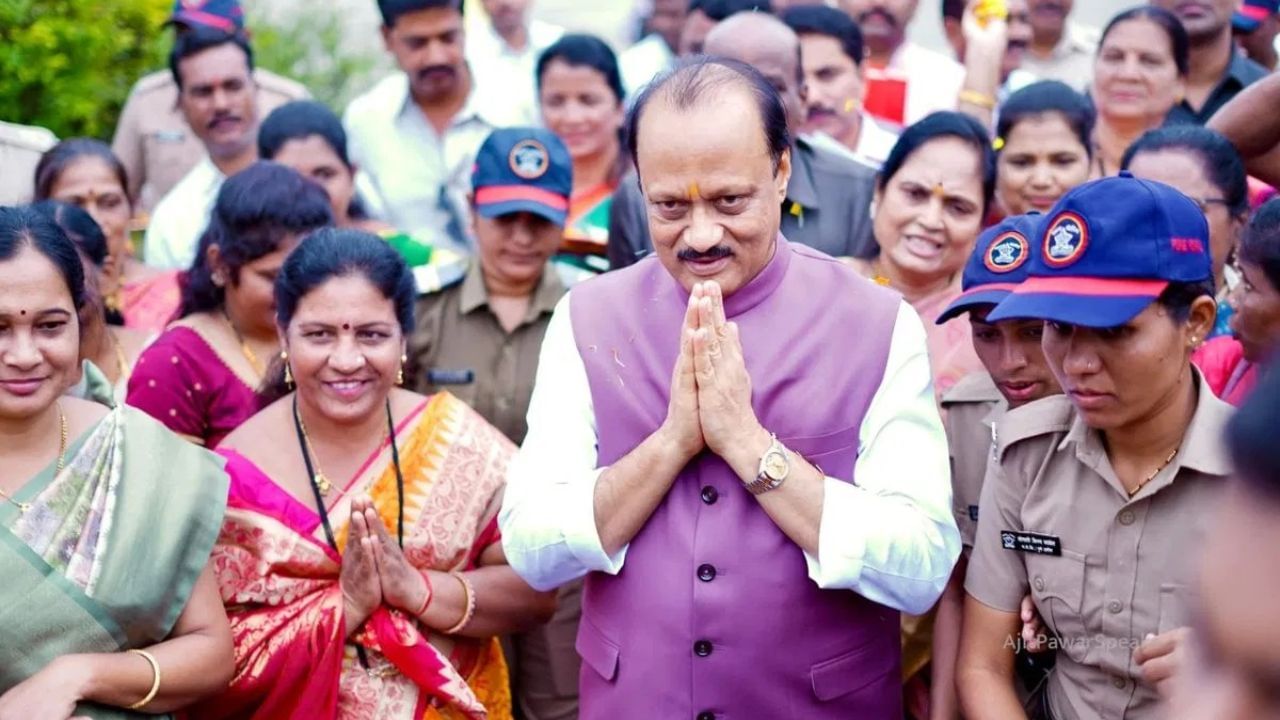


NCP leader Ajit Pawar's election campaign in Maharashtra has been focused on the color pink, symbolizing feminine energy and garnering support from women voters. As the Mahayuti alliance leads in the state, Pawar's party is performing well in 36 constituencies, including his own in Baramati where he is currently leading with a significant margin. This victory holds extra significance for Pawar, who is using the color pink to not only claim victory, but also to avenge the perceived betrayal by his uncle and political rival Sharad Pawar. The use of this strategic color scheme in his campaign has also been seen in his wardrobe, with reports claiming that he owns 18 pink jackets. Ultimately, the success of the NCP's pink campaign could help decide the fate of the ruling alliance in Maharashtra.
Ajit Pawar's Pink Campaign: A Symbol of Women's Empowerment and Political Rivalry
Background
Ajit Pawar, a prominent leader of the Nationalist Congress Party (NCP), has adopted the color pink as a central theme of his election campaign in Maharashtra. This unconventional choice symbolizes feminine energy and aims to garner support from women voters, who make up a significant portion of the electorate.
Pink as a Symbol of Women's Empowerment
In India, pink is traditionally associated with femininity and nurturance. By using this color, Pawar is seeking to connect with women voters on a personal level, highlighting their importance in the political process. The pink campaign also represents the NCP's commitment to women's welfare and empowerment.
Political Rivalry with Sharad Pawar
The use of pink in Pawar's campaign also carries a layer of political significance. Pawar has had a long-standing rivalry with his uncle, Sharad Pawar, who is the chief of the NCP. In 2019, Pawar had accused his uncle of sidelining him within the party and working against his interests.
The pink campaign is seen as a symbolic act of rebellion against Sharad Pawar. By claiming ownership of the color associated with femininity, Ajit Pawar is asserting his independence and challenging his uncle's authority.
Election Performance
As per the latest reports, the NCP is performing well in 36 constituencies in Maharashtra, including Baramati, where Ajit Pawar is leading with a significant margin. The success of the pink campaign is believed to have played a role in boosting the party's performance, particularly among women voters.
Top 5 FAQs:
Why is Ajit Pawar using pink as his campaign color? To symbolize feminine energy, garner support from women voters, and express his independence from his uncle, Sharad Pawar.
What is the significance of the number 18 in the pink campaign? Pawar reportedly owns 18 pink jackets, which represent the 18 Vidhan Sabha constituencies where the NCP is fielding candidates.
How has the pink campaign affected the NCP's election performance? The pink campaign is believed to have boosted the NCP's performance among women voters and contributed to the party's strong showing in several constituencies.
What is the political rivalry between Ajit Pawar and Sharad Pawar? Ajit Pawar has accused his uncle of sidelining him within the NCP and working against his interests. The pink campaign is seen as a symbolic act of rebellion against Sharad Pawar.
What are the implications of the NCP's success in the Maharashtra elections? The success of the NCP could strengthen Pawar's position within the party and influence the formation of the next government in Maharashtra.

During a public meeting in Bihar, Union Home Minister Amit Shah dismissed any speculation about leadership changes by firmly stating that there is "no seat vacant" in politics. Praising Chief Minister Nitish Kumar and Prime Minister Narendra Modi, Shah urged the people of Bihar to vote for the NDA in the upcoming assembly elections. He also addressed various issues such as the construction of the Ram Temple and the ban on PFI, while emphasizing the NDA's strong leadership in the state.

Union Home Minister Amit Shah expressed his confidence that the BJP will emerge victorious in the upcoming assembly elections in West Bengal. He also criticized Chief Minister Mamata Banerjee and the ruling TMC for their opposition towards the special revision exercise for the voter list. The minister defended the legitimacy of the process and supported the Election Commission, while the opposition claims it is a ploy to manipulate voter lists before the polls.

Union Home Minister Amit Shah criticised the opposition's manifesto promise of providing government jobs in Bihar if they come into power. Calling it "nonsensical", Shah stated that such a promise is absurd and the opposition knows they will never come to power and will not have to fulfil any promises made. He also pointed out that the opposition's manifesto ignores the development strides made in Bihar, such as electricity and clean water reaching every village.

In an exclusive interview with News18 India, Union Home Minister Amit Shah dismissed Rahul Gandhi's allegations of "vote chori" (vote theft) and assured the people of Bihar that the BJP will take action against every single infiltrator in the country. He also addressed concerns about Nitish Kumar's health and stated that the Bihar CM was holding four rallies a day, proving that there was no question of his health being in poor shape. Additionally, Shah criticized the opposition's attempt to create a negative perception about Nitish Kumar.

In a recent interview with News18 India's "Sabse Bada Dangal Bihar 2025", Union Home Minister Amit Shah confidently stated that the NDA will form a government with an unprecedented two-thirds majority in the upcoming Bihar assembly elections. Shah also vehemently denied any concerns raised by the opposition regarding the health of Chief Minister Nitish Kumar, stating that both he and Kumar are holding four rallies a day. This marks a major shift in the political equation in Bihar, as the BJP and JD(U) are contesting an equal number of seats, a first in the state's electoral history.

PM Modi delivered a speech at the Maritime Leaders' Conclave in Mumbai, praising the government's efforts in revolutionizing and modernizing the country's shipping sector. He emphasized the nation's ports as being among the most efficient in the developing world, declaring that India has made significant progress in this area.

Union Minister Dharmendra Pradhan, who is also the BJP's in-charge for the Bihar polls, has strongly criticized Congress leader Rahul Gandhi for his derogatory comments against PM Modi. Pradhan has demanded a public apology from Gandhi for his remarks, stating that they are against basic norms of public discourse. He further added that this reflects the Congress' deep-rooted resentment and frustration towards PM Modi and his leadership. Meanwhile, Rahul Gandhi has kicked off his poll campaign in Bihar with a scathing attack on PM Modi, accusing him of "enacting all types of drama" for votes and running the state through remote control.

Elon Musk's xAI has launched Grokipedia, an AI-powered online encyclopedia to rival Wikipedia. Musk aims for the platform to be a "massive improvement" and free from any political bias. While Grokipedia currently sources content from Wikipedia, Musk plans to have all original content by the end of the year. This development adds to Bihar's political landscape, where leaders like Lalu Prasad and Nitish Kumar have dominated with their OBC politics, while Nitish's developmental narrative has transformed the state's political landscape.

BJP leader Chandrashekhar Bawankule sparked controversy with his statement that party workers' phones and WhatsApp groups are being monitored ahead of local body elections. Shiv Sena leader Sanjay Raut demanded his arrest, alleging that the phones of several Opposition leaders were also tapped. Bawankule clarified his statement, but the Sena leader questioned the involvement of BJP offices and technology networks, calling it a potentially anti-national act.

The Election Commission (EC) has announced the schedule for Special Summary Revision (SIR) of electoral rolls in 12 states and Union Territories (UTs) for the year 2025, excluding Assam due to the ongoing National Register of Citizens (NRC) process. While the BJP has welcomed the announcement, the Congress has raised concerns and questioned the decision. The Chief Election Commissioner (CEC) has stated that Assam has a separate provision in citizenship laws and the NRC process must be taken into consideration, causing potential delays in the SIR preparations. Despite the physical closure of banks in Ranchi and Patna, financial services will remain available through digital and self-service platforms, so customers are advised to use online banking and plan any in-branch visits accordingly.